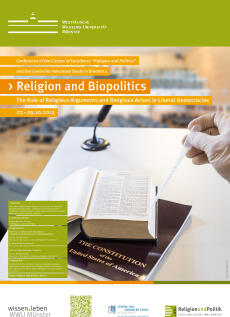Religion and Biopolitics
Conference on religious arguments on bio-political topics such as cloning and embryo research

Bio-political questions are nationally and internationally important and there is profound moral-ethical disagreement about whether such technologies – as embryo research or cloning – should be allowed or forbidden. Among the social groups that strongly shape the character of these debates are many religious organizations and actors. But the legitimacy and the functionality of such religious interventions into the secular state are both politically and theoretically controversial.
The controversy centers on the liberal thesis that public debates – in particular decision making processes – should be restricted to arguments and reasons which are in principle accessible, intelligible and agreeable to all citizens. And religious arguments and reasons do not fulfil these standards. Despite this theoretical debate there is a lack of empirical knowledge about the extent, nature and consequences of the use of religious arguments. Therefore, it is of specific interest in what ways religious traditions and actors formulate their bio-ethical positions and which kinds of reasons they give to validate their positions. Moreover: how do religious actors influence politics, for example in which ways and under what conditions do religious positions and arguments achieve influence in political decisions?
The Conference deliberations will focus on two themes: First, epistemological and philosophical questions on the role of religious actors and arguments in liberal democracies and second, empirical case studies of the political discussion processes on stem cell research, therapeutical and reproductive cloning as well as preimplantation genetic diagnosis. The event is organized by Political Scientists Prof. Dr. Ulrich Willems and Dr. Mirjam Weiberg-Salzmann from the Cluster of Excellence “Religion and Politics” as well as by Philosopher Prof. Dr. Michael Quante from the Centre for Advanced Study in Bioethics and the Cluster of Excellence. (exc/ska)

